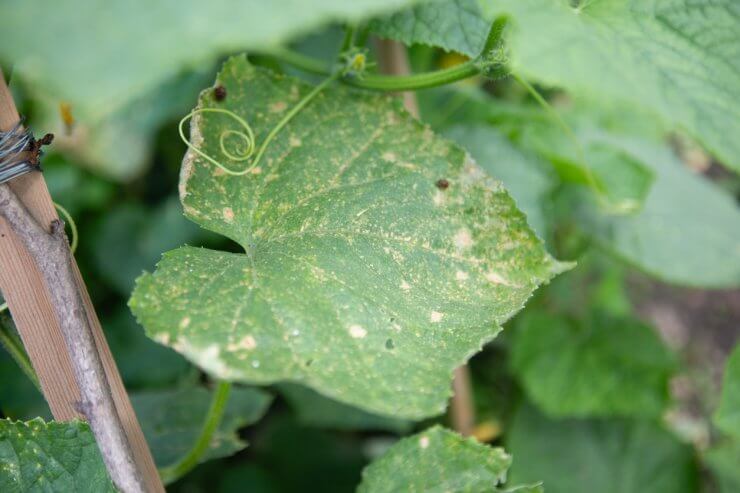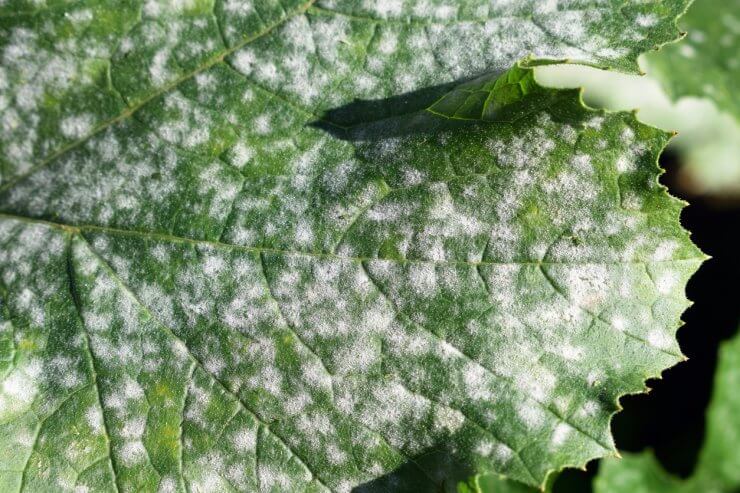
As gardeners, there’s no shortage of disappointments out there waiting to swoop in and ruin the enjoyment of your garden. Rabbits may eat your strawberries, seeds may never germinate, and your nosy neighbor might tell you all the ways he thinks you’re planting your cucumbers wrong. But vegetable diseases are on another level.
Unlike pests, like the tomato hornworm, for example, vegetable diseases are invisible. You can’t just pick them off or blast them with the garden hose. You won’t even know your favorite heirloom kale is infected until you see the brown spots on the leaves. What is a gardener to do? Cry out to the gods and pledge your soul for a healthy crop of Lacinto Kale? That might be a bit dramatic, but there is a lot you can do to prevent and treat some of the most common vegetable diseases.
Discover 7 top tips for growing, harvesting, and enjoying tomatoes from your home garden—when you access the FREE guide The Best Way to Grow Tomatoes, right now!

Conquering vegetable diseases before they conquer your garden
Vegetable diseases are a fact of gardening. I’ll touch on a few ways to treat diseases below, but first, let’s talk about ways to prevent disease.
There are a few steps you can take to prevent vegetable diseases before they infect your plants.
- Grow disease-resistant varieties.
- Take advantage of companion planting.
- Rotate crops (It’s an oldie, but a goodie).
- Water properly so your plants aren’t sitting in constantly damp soil.
- Use mulch to prevent contaminated soil from splashing onto your plant leaves.
- Use trellises for vining plants, so there is plenty of air circulation among leaves.
Prevention is, naturally, your best option, but even so, it’s important to know how to treat diseases. Even the most diligent gardeners will, at some point, end up with an infected plant or two.
1. Root rot: Root rot can be challenging to diagnose since, in some cases, it looks like your plant isn’t getting enough water. Leaves become droopy and yellowed, and the plant looks “sad.” In fact, the culprit is often too much water due to poor drainage. Your best option here is to dig up the plant, clean off the roots, and remove any dead or mushy roots with garden shears. You can replant the vegetable at that point, but you may or may not have success in a revival.
2. Powdery mildew: The name of this fungal disease describes its appearance quite well. The leaves of your favorite vegetables will look like they’ve been dusted in powder. To treat powdery mildew, spray Neem oil on your plants.
3. Fusarium wilt: As you can guess, Fusarium wilt, as well as Verticillium wilt, are two vegetable diseases that cause wilting and drooping. Unfortunately, your only option for treatment is to remove and destroy infected plants.
4. Rusts: Rust diseases won’t kill your vegetables, but they may prevent them from bearing fruit. True to its name, rust diseases look like spots of rust on your plants. You can try to remove the infected parts of a plant, but it’s best to remove and destroy the entire plant in more severe cases.
5. Anthracnose: If you notice small yellow or dark spots on the leaves of your plants, they may be infected with this fungal disease. Anthracnose can spread quickly, especially through watering, and it can reduce your favorite veggies to a pile of rot quickly. If you catch it early enough, you can attempt to treat infected plants (and nearby plants that might also be infected) with Neem oil. Your other option is to remove and destroy any infected plants.
As disappointing as these vegetable diseases can be, if you can prevent them or catch them early on, your garden will be just fine. You’ll have a rich harvest of all your favorites in no time.
What kind of vegetable diseases have you had to deal with, and how did you treat them? I’d love to get your thoughts in the comments!
Discover 7 top tips for growing, harvesting, and enjoying tomatoes from your home garden—when you access the FREE guide The Best Way to Grow Tomatoes, right now!





My mother used to use the beer bowl. I thought she was crazy but it worked. my father was upset when he saw the beer, he thought she was going to drink it. How funny, she looked at him in a weird way, and its for the slugs in the garden. You know I don’t like beer. they both had a good laugh. this had to 50 years ago easily.
I think my garden bed has diseased soil now. My cucumbers got spots, wilted and dried up. They had plenty of water and fertilizer. I pulled them up and planted new ones. They have yellow spots now and the basil plants around them are turning yellow. PLEASE HELP!
How do I fix the soil?
We have tons of information on soil testing. This should be your first step in determining what is happening in your garden. Check out the posts here: https://foodgardening.mequoda.com/?s=soil+testing
BROWN SPOT!!!!! YIKES!!! I seem to have it on gardenia, tomatoes, sweet potatoes!!! I’ve used copper spray but it has killed several of my plants.
HELP!!
Thanks, Amanda. LOVE your articles, tips, and advice!!!
Elaine
Brown spots are often associated with fungal infections but they can also arise if you soil ph is off or if it is deficient in certain nutrients. If you haven’t done a soil test in a while, give it a go and see if that is the culprit.
My tomatoes the leaves are curling up and I am not sure what to do about it
how do you treat scabe on potatoes?
Scab is an issue that will stay in the soil for years, so your best bet is a 3-5 year crop rotation (excluding root vegetables). You can also try to keep the pH in the 5 range with sulfur, because high pH is a contributing factor.
My cucumber have yellow post a little holes in the leaves . they are hanging up growing down in pots.
The good news is that small yellow dots, and even holes are how iron deficiency appear in cucumber plants, which is fairly easy to fix. If it’s pests, it’s best to take a close look and see who might be the culprit. Rarely do pests leave the plant until it’s gone, so surely it’s still there, red handed!
I have the very same issue/problem. And, My reply is a question about my Eggplant and the very tiny holes in the leaves. What tha heck? I’ve just planted them about a month ago and there are very tiny holes in all the leaves.
What is it and what can I do about it? HELP!!
It’s hard to say without seeing the holes, but flea beetles love eggplant, so if they’re quite small holes covering the whole leaf that’s probably them! Dusting the leaves with talcum powder is said to help, but I always go for the Neem oil spray myself!
Hi Amanda, I have been an organic gardner for a long time, I learn new things every year. I have enjoyed your articles on tomatoes, very helpful.
I have had a reoccurring problem with kale, all varieties. I do crop rotation, but the kale infestation follows everywhere. The plants grow well, but little holes appear on every leaf, cannot find any visible bugs or tracks. I don’t harvest the kale due to this problem.
Any advice would be welcome.
Thank you
Mara Urshel
Remsenburg, NY
Murshel@kleinfeldbridal.com
Hi Mara, have you tried simple solutions like a neem oil spray? I wonder about slugs because they tend to be the culprit in my garden and will chew little holes. I have tried making a little fence around the greens with plastic forks that they don’t generally climb over, and I’ve caught quite a few with the ‘ol bowl of beer trick (they fall in, get drunk, and can’t get out). Caterpillars are another culprit I’d look for. Once you find out who is to blame, it’s easier to treat!